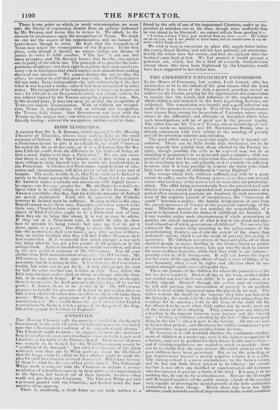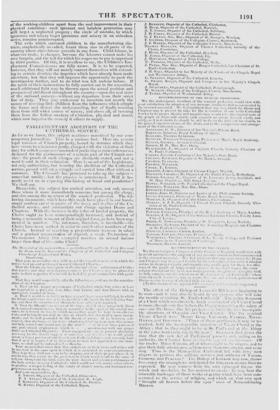THE CHILDREN'S EMPLOYMENT COMMISSION.
IN the House of Commons, last session, Lord Asnissr, who has undertaken to be to the intimts of the poor classes what the Lord Chancellor is to those of the rich, a general guardian, moved an address to the Crown, praying for the appointment of a commission to baptise into the nature and influence of the employment to which children, not included in the laws regulating, fitetories, are subjected. The commission was issued; and a good' selection was made of the persons to execute it. Two of the four Commissioners were chosen from among the Inspectors of Factories, whose expe- rience in the difficulties and attempts at deception which beset such investigations will be of great use in the present inquiry. The other two are Mr. Tnomss Torso to whose knowledge of eco- nomies needs tio mention, and Dr. Soternw000 Sorro, who is already conversant with what relates to the posology of poverty and all its attendant miseries and mistakes.
The good which such a Commission might effect is beyond cal- culation. There can be little doubt that disclosures are to be made scarcely less painful than those elicited by the Factory in- quiry, though possibly the evils to be exposed may not be so sweeping or perpetrated in so gross and open a manner; while ex- perience or what the Factory supervision has effected—cumbersome as its machinery may be, and palpably as it is evaded—is suflicient to prove that it is very possible to remove the worst evils which
have been the scourge of childhood in "merry England."
The wronos which little children suffered, and still to a great
extent do suffer, under the Factory system, arose from one general cause—the tendency of the system was to neutralize the parental in-
stinct. The c4tild being removed early from the parental roof, and
thrown among a crowd of unguarded and untaught associates, at a period when awakening passions are deprived, by such association,
even of the negative control of inexperience, the "innocence of
youth" becomes a nullity : the human being passes at once from the vacant ignorance of infancy to the prennuure knowledge of the roue. Whether married or not married, the responsibility of a
parent is incurred before the duties of childhood are learned. Is it any wonder, under such circumstances, if whole generations of' parents are utterly ignorant of what is due to the moral and phy-
sical education of whole generations of children ? No One alma has witnessed the scenes daily occurring in the police-courts or the
manufacturing districts, can doubt the extent of the misery thus
indicated--misery which is not the result of poverty, but merely of 1g1101%111CC. 11e will there see groups of boys and girls, all of them married people or worse, herding to the witness-boxes as parties or witnesses in beer-house rows; lads put into the duck to answer for some reckless depravity, while thole first child is yet unborn— possibly even in their honeymoon. It will lot lessen his regret nor his sense of' the aplialling effects of such tt state of things, if lie sees humanity, often losert its rights and affection show its un- tutored strength amid seems of squalid vice.
These are parents of the children for whom the protection or the law has been required. Busied all day at the loom, neither father
nor mother can tend their own child : it IA put out to nurse, at it
weekly stipend. Hurried through the earlier part of existence by toil and passion, the intervention of progeny is an accident
which is most vividly inipressed upon the parent by its cost. The
father reel«ins his ffimily by the expense they have put him to in the lying-in ; the mother, by the weekly half-crown wrong from her eernines for its nursing ; both by the keep of the child till the
law allows it to be used, when their outlay can be made good out of the sinews of their offspring. They cannot spare any thing for scheoling in the interval between mere inlitiley and the "lawful age " ; besitie, it will have schooling by the law—" that is Mir good thing in the law "—when it goes to the fictory. All arts are used to Listen that period ; and olleutimes the child is maineuvered past the inspecting surgeon some months tod'ore its time. If, however, it is still doubtful whether the continuous employ-,
nest of children at a tender age, even in the light, r occupations of a factory, limy net he perilous for their future kohl' and went-c-
owl if' existing regulations are evaded Its 11111Cil as IR/Still/IC there can be 110 110111/t that the store serious ilk which used to visit the poor children have been prevented. But as to the schooling, or any h»provement beyond a merely negative refinm, it is a joke. The factory-school is a mere encumbrance to the factory-owner, and he has but little direct interest in its efficacy : the school- teacher is too often any disabled or superannuated old workman who has interest to procure at berth attic kind. If a man is tit fur nothing else, lie can do for a schoolmaster. Nor are the ill-taught and ill-trained teachers of the public society sellouts of the coutOry
very capable of directing the mental growth of the little multitudes
committed to their charge. Hence there has been but 'little advance made towards a radical improvement in the moral condition of the working-children apart from the real improvement in their physical condition : each ignorant and helpless generation may still beget a neglected progeny ; the circle of mistake, by which ignorance and misery beget ignorance and misery in an unbroken series, remains uninterrupted.
The evils which surround children in the manufacturing dis- tricts, emphatically so called, haunt them also in all parts of the country where class-labour prevails in any form. Child-labour, in whatever trade, is cheaper, because the labourer cannot make his own bargain, and the toil fbr which his wages are to pay is appraised by third parties. Of this, it is needless to say, the Children's Em- ployment Commissionos arc fully aware. It is to be expected, however, that they will not merely content themselves with extend- ing to certain districts the inquiries which have already been made elsewhere, but that they will improve the opportunity to push the investigation further, and to do what was left undone before. If the spirit of their instructions be fully carried out in the execution, much addithmal light may be thrown upon the actual position and prospects of childhood throughout the country—upon the real state of the national nursery—without any departure from their strict line of duty. They may endeavour to ascertain not merely the means of rescuing little children from the influences which cripple the frame and distort the understanding, but of finally rescuing them from still wider causes of misery, and above all, of rescuing them from the hollow mockery of education, physical and moral, which now impedes the remedy it affects to supply.
PskitI,I,VMEN'PARY All()LITI()N OF TIIE EI)11A1, SERVICE.'
As far as we know, this subject continues unnoticed by out' con- temporary journalists. This is it curious fact. Here are certain legal trustees of Church twoperty, bound by statutes which they have sworn to a.lmillister justly, charged with the %iolation of their
ditty fOr selfish pitrposes—accused of pocketing cc rutin endowments designed tin' the perfori»auce of a certain lain of the Church ser- vice : the proofs of such charges are distinctly stated, and not a word is said in their refutation. Ilene is an act of tla, Legislature, not only authorizing, but insuring the abolition of the Cathedral service, passed without a struggle and carried into effect without a comment. The Chrollicie has promised to take up the subject — somewhat tardily ; but the promise is turredeemed. Will it ho- nestly assist us in exposing this history of fraud and peculation? 'Vic shall see.
1\Icanwlnile, the subject has excited attention, not only among those whom it loon! immediately concerns, but among the clergy, and also among the members of the musical profession. 'fine 161- lowing documents, which have this week been placed in our hands, amply confirm our statements of the decay and line Of the Ca- thedral service, and substantiate our charge against Deans and Chapters. With tho increase in the value of landed property, the Choirs ought to In co correspondingly increased, and instead of being a fiCserable Fenn:mit of their original force, to have been aug- mented in number. '11.ie inference, therefore, is inevitable—the Choirs have been robbial in order to enrich other members of the Church. Instead of Yi (A'11.111:3. a proportionate increase in salary and a gradual tmailicutation of' stipend, a single Prebendary of Westminster Althey (for example) receives an annual income larger than that of the entire Choir!



























 Previous page
Previous page